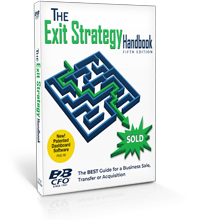
by Ania Kubicki | Oct 2, 2014 | Archives
B2B CFO’s Vice President of Operations, Joe Worth, a.k.a. Entrepreneur Magazine’s “The Money Guy” discusses business transition. Read...

by Ania Kubicki | Sep 19, 2014 | Archives
B2B CFO Partner Chris James shares best practices on how to manage money without a money manager with the Dallas Business Journal. Read...

by Ania Kubicki | Sep 3, 2014 | Archives
Mergers and acquisitions advisors are constantly seeking out business owners who would like to sell their businesses, but sometimes red flags prevent a sale from taking place. B2B CFO, a firm that provides chief financial officer services to owners of mid-market, privately-held companies, has developed an M&A Incubator Program to help business owners whip their companies into shape and ready them for sale. “There was a niche of companies (that M&A advisors) cannot help because the companies are not ready for a transaction,” said Jerry Mills, founder and chief executive officer of B2B CFO. “There’s typically only about six or seven things that need to be done to help a company get ready for an M&A transaction.” The M&A Incubator Program is part of the company’s B2B Exit division, through which Mills last year published “The Exit Strategy Handbook” to guide businesses step-by-step through preparing a business for sale. The M&A Incubator is a self-guided software program, in beta testing now, which follows similar steps and principles. In this way, M&A advisors can develop potential clients and business owners can increase the sale price of their business through a virtual “incubator” process. There are eight B2B CFO partners in southeastern Wisconsin, who are helping to implement the nationwide rollout of the M&A Incubator by the end of this year. B2B, which is based in Phoenix and has more than 200 partners in 45 states, plans to approach M&A firms nationwide and partner with them, Mills said. The M&A firm would introduce B2B CFO partners to clients who aren’t ready to complete a transaction, and B2B would help the client complete...

by Ania Kubicki | Aug 15, 2014 | Archives
There are numerous options for the entrepreneur who decides it’s “time to move on” by Amy R. Handler, In Business Magazine August 2014 Are there any true positives that can come from selling a business? Yes, say three experts who have experience making cash-outs and exit strategies both happy and lucrative events. There are various reasons an entrepreneurial owner may decide to sell a successful and profitable company, says Orville (Chip) Fisher, an attorney, investment banker and managing director at the private investment-banking firm Greene Holcomb & Fisher in Phoenix. “These reasons may include old age and health, or the desire for a new owner to take a company to the next level. Another reason might be that the owner wants to take some money out of the company and diversify,” he says. In many cases, the seller wants to start a new business, but it is seldom in the same field as the business he or she just exited because buyers usually ask sellers to sign a non-compete clause lasting at minimum five years, points out Jerry Mills, founder of B2B CFO, which provides CFOs to companies on an outsource basis. However, having sold their company at a profit, sellers may go on to continuously purchase and sell new companies in varying fields; there are many successful businesspeople who have thus earned the nickname “serial entrepreneur.” It may be time to cash-out a company when that company has exceeded all expectations and the entrepreneur, investors and employees have all secured financial success, turning the company over to a new entrepreneur and investment group to grow the business...

by Ania Kubicki | Jun 10, 2014 | Archives
Jerry Mills, founder and CEO of B2B CFO®, answers questions regarding business exiting and advising in this interview hosted by Fundology. ...

by Ania Kubicki | May 1, 2014 | Archives
Take a load off your HR By Joe Worth Q: What’s a PEO, and why should I use one? A: Here’s all you need to know: A Professional Employer Organization (PEO) is one of the best-kept secrets of many successful small businesses. Essentially these bodies handle all your HR needs, including payroll and administration, employee health and retirement benefits, workers’ compensation insurance, state and federal compliance issues and even worker training. All you’re left to do is hire, supervise and promote (or fire) your employees as needed. Of course there is a cost for contracting out your HR department, but consider this list of positives. PEOs manage thousands of employees and can therefore purchase insurance and benefit plans at a significant savings or allow you to offer higher-quality plans to attract and retain skilled employees. Experienced professionals in HR, benefits, payroll, risk management and other aspects of employee administration are on the job. Want to institute a 401(k) plan or flexible spending account? The PEO will do it. No need for you to figure it out yourself. The PEO will provide HR manuals for your employees, and the policies and procedures will be maintained in compliance with ever-changing state and federal laws and regulations. A PEO will help employment-related regulatory compliance (ADA, payroll, OSHA, EEOC, etc.), a huge advantage that can be worth more to your business than the money saved on benefits costs. The PEO can provide effective management and access to payroll records, benefits, personnel data, vacation and sick-time accruals and specialized reports. If you have an HR-related employee claim, such as discrimination allegation, a PEO will...









